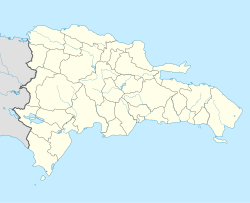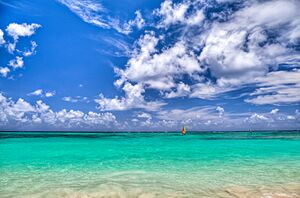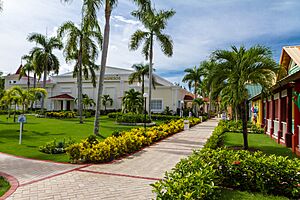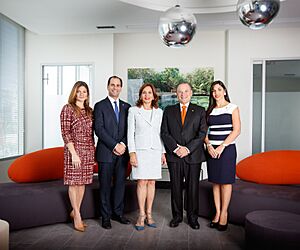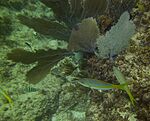Punta Cana facts for kids
Quick facts for kids
Punta Cana
|
||
|---|---|---|
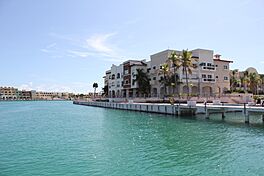
Cap Cana Marina area in Punta Cana, Dominican Republic
|
||
|
||
| Country | Dominican Republic | |
| Province | La Altagracia Province | |
| Municipality | Higüey | |
| Incorporated (town) | 27 June 2006 | |
| Area | ||
| • Total | 475.3 km2 (183.5 sq mi) | |
| Population
(2022)
|
||
| • Total | 138,919 | |
| • Density | 292.28/km2 (756.99/sq mi) | |
| Time zone | UTC−4 (Atlantic) | |
| Area code(s) | 809, 829, and 849 | |
Punta Cana is a popular resort town located on the eastern coast of the Dominican Republic. It officially became a town, known as "Verón–Punta Cana township," in 2006. This area is part of the larger Higüey municipality in La Altagracia Province. In 2022, about 138,919 people lived in this district.
Punta Cana is one of the most visited places in Latin America. It welcomes more tourists than any other city in the Caribbean. The Punta Cana International Airport (PUJ) is located about 3 kilometers (1.9 miles) inland. This airport handles 64% of all flights arriving in the Dominican Republic. It serves more passengers than the airport in Santo Domingo, the country's capital.
The region is famous for its beautiful white sand beaches and clear blue waters. These beaches face both the Caribbean Sea and the Atlantic Ocean. The weather is warm for most of the year. It gets especially hot and sunny in late summer and autumn.
Contents
Discovering Punta Cana's Geography
The Punta Cana area has a population of around 100,000 people. This number was growing quickly in 2011. To the north, you'll find the beaches of Cabeza de Toro, Bávaro, and El Cortecito. The closest major city is Higüey, which is 500 years old. It's about 45 kilometers (28 miles) away, taking about an hour to drive there. Most of the more than 50 large resorts in Punta Cana are owned by European companies, especially Spanish hotel chains.
The coastline here stretches for about 100 kilometers (62 miles). It often has a gentle breeze. The ocean waters are mostly shallow, with many natural pools where visitors can swim safely. Some of the main beaches from north to south include Uvero Alto, Macao, Arena Gorda, Bávaro, El Cortecito, Las Corales, and Cabeza de Toro. These are all north of the main cape. South of the cape are Cabo Engaño, Punta Cana, and Juanillo.
Bávaro: A Hub for Tourists
Bávaro was originally planned as a town for hotel workers. However, it has grown into a major center for tourist services. This happened as hotels expanded north of Punta Cana, especially around Bávaro beach.
Many fun attractions have been built here. For example, Manatí Park in Bávaro is a water park with manatees, dolphins, and other animals. The Punta Cana beach area is very popular with tourists because it offers good value.
Bávaro is connected by road to Higüey and La Otra Banda. It stretches about 15 kilometers (9.3 miles) north to Playa Macao. Other nearby beaches are Uvero Alto, Roco Ki, and La Vacama. Bávaro itself has 10 kilometers (6.2 miles) of beaches. A big meeting of leaders from 21 Spanish and Portuguese-speaking countries took place here in November 2002.
Punta Cana Village: A Planned Community
Punta Cana Village is a planned community with about 3,000 residents. The Punta Cana Group started developing this area in 1969. The main road, Boulevard Primero de Noviembre, has low office buildings. Side streets lead to gated communities with homes. There are also small apartment buildings. A shopping area is located near the airport. East of the village, you'll find the Westin Resort and a golf course by the ocean. There's also a public beach called Playa Blanca. South of Punta Cana Village is Cap Cana, another upscale community.
Punta Cana's Tropical Climate
Punta Cana has a tropical wet and dry climate. This means it has a hot, rainy season and a warm, drier season. The weather stays pretty much the same all year. The average temperature is around 26°C (79°F). The hot and humid season runs from May to October. During this time, daytime temperatures can reach 35°C (95°F). From November to March, evening temperatures are around 20°C (68°F).
| Climate data for Punta Cana International Airport (1991–2020) | |||||||||||||
|---|---|---|---|---|---|---|---|---|---|---|---|---|---|
| Month | Jan | Feb | Mar | Apr | May | Jun | Jul | Aug | Sep | Oct | Nov | Dec | Year |
| Mean daily maximum °C (°F) | 28.5 (83.3) |
29.0 (84.2) |
29.0 (84.2) |
29.8 (85.6) |
30.3 (86.5) |
31.2 (88.2) |
31.8 (89.2) |
32.0 (89.6) |
31.9 (89.4) |
31.5 (88.7) |
30.3 (86.5) |
29.4 (84.9) |
30.4 (86.7) |
| Daily mean °C (°F) | 24.8 (76.6) |
25.1 (77.2) |
25.4 (77.7) |
26.2 (79.2) |
26.9 (80.4) |
27.7 (81.9) |
28.0 (82.4) |
28.2 (82.8) |
28.0 (82.4) |
27.6 (81.7) |
26.6 (79.9) |
25.6 (78.1) |
26.7 (80.1) |
| Mean daily minimum °C (°F) | 21.2 (70.2) |
21.2 (70.2) |
21.7 (71.1) |
22.5 (72.5) |
23.5 (74.3) |
24.2 (75.6) |
24.2 (75.6) |
24.3 (75.7) |
24.1 (75.4) |
23.8 (74.8) |
22.9 (73.2) |
21.9 (71.4) |
23.0 (73.4) |
| Average precipitation mm (inches) | 84.7 (3.33) |
62.8 (2.47) |
50.4 (1.98) |
64.9 (2.56) |
129.3 (5.09) |
93.7 (3.69) |
84.7 (3.33) |
106.7 (4.20) |
135.3 (5.33) |
123.6 (4.87) |
131.1 (5.16) |
91.3 (3.59) |
1,158.6 (45.61) |
| Source: NOAA | |||||||||||||
Punta Cana's History and Growth
In the late 1960s, a young Dominican businessman named Frank Rainieri and a New York lawyer, Theodore Kheel, bought a large piece of land. This land was on the eastern tip of the Dominican Republic. At that time, the area known as Punta Cana was mostly undeveloped coastline. The closest big city, Higüey, was a five-hour drive away.
Their first project was a 40-room hotel called the Punta Cana Club. In 1970, Rainieri changed the area's original name to Punta Cana. Later, in 1978, the Paris Mediterranean Club joined the project. They built a 350-room hotel. Other hotel groups also started building in the Bávaro area.
In 1979, the Hotel Puntacana was built. Then, in 1984, the Punta Cana International Airport opened. More roads and buildings were also developed. In 1993, work began on the Marina de Punta Cana Resort & Club. Famous people like designer Óscar de la Renta and singer Julio Iglesias joined the project in 1996. In the 2000s, the first residential communities were built.
The resort has always focused on caring for the environment and local communities. The Puntacana Foundation has a large nature reserve. This reserve is used for scientific research and protects endangered animals. The foundation has also opened two schools and a free health clinic for the local community of Véron.
Exploring Tourism and Activities
Punta Cana is a major tourist spot. It plays a big role in tourism in the Dominican Republic.
Getting Around: Transportation
The Punta Cana International Airport is the main airport for the area. In 2014, over 2.4 million passengers arrived here. This made it the second-busiest airport in the Caribbean. The Grupo Puntacana built this airport in 1984 to help tourism grow. It was the first international airport in the Western Hemisphere to be owned by a private company.
Fun Things to Do and See
Many activities in Punta Cana involve the ocean. You can go snorkeling, windsurfing, or ride a banana boat. There are also speedboat tours, scuba diving, and catamaran cruises. You can even go deep-sea fishing. Some tours let you swim with dolphins and sharks or snorkel with stingrays.
If you want to see more of the Dominican countryside, there are land tours. These include safari tours, horseback riding, and dune buggy adventures. You can also take day trips from Punta Cana to smaller Caribbean islands like Saona and Catalina.
The capital city, Santo Domingo, is a couple of hours away. You can also visit Los Haitises National Park and Samaná. The Basilica Catholic Monument, built in 1962, is in nearby Higüey. This church was designed by two French architects.
Diving Adventures
Because it's located on the Caribbean Sea, diving is a popular activity. The ocean area around Punta Cana was made a marine reserve in 2012. This helps protect the amazing underwater life.
Staying Safe in Punta Cana
Punta Cana is generally a very safe place to visit. There were some concerns in 2019 about tourist deaths. However, investigations found that these deaths were due to natural causes.
Amazing Marine Life in Punta Cana
The waters around Punta Cana are home to many different kinds of marine animals. Here are some of the species that have been found there:
| Group | Common name | Scientific name | Image | Notes |
|---|---|---|---|---|
| Fish | yellowtail snapper | Ocyurus chrysurus | ||
| queen triggerfish | Balistes vetula | |||
| glasseye | Heteropriacanthus cruentatis | |||
| whitespotted filefish | Cantherhines macrocerus | |||
| spotted goatfish | Pseudupeneus maculatus | |||
| yellow goatfish | Mulloidichthys martinicus | |||
| Bermuda chub | Kyphosus sectatrix | |||
| great barracuda | Sphyraena barracuda | |||
| bar jack | Caranx ruber | |||
| saucereye porgy | Calamus calamus | |||
| French angelfish | Pomacanthus paru | |||
| southern stingray | Dasyatis americana | |||
| yellow stingray | Urolobatis jamaicensis | |||
| spotted eagle ray | Aetobatus narinari | |||
| Caribbean reef shark | Carcharhinus perezi | |||
| goldentail moray | Gymnothorax miliaris | |||
| spotted moray | Gymnothorax moringa | |||
| mangrove snapper | Lutjanus griseus | |||
| mutton snapper | Lutjanus analis | |||
| porkfish | Anisotremus virginicus | |||
| black margate | Anisotremus surinamensis | |||
| blue striped grunt | Haemulon sciurus | |||
| Caesar grunt | Haemulon carbonarium | |||
| French grunt | Haemulon flavolineatum | |||
| Spanish grunt | Haemulon macrostomum | |||
| tomtate grunt | Haemulon aurolineatum | |||
| white grunt | Haemulon plumierii | |||
| black grouper | Mycteroperca bonaci | |||
| coney | Cephalopholis fulva | |||
| Nassau grouper | Epinephelus striatus | |||
| sergeant major | Abudefduf saxatilis | |||
| lucky grouper | Epinephelus guttatus | |||
| yellowfin grouper | Mycteroperca venenosa | |||
| graysby | Cephalopholis cruentata | |||
| harlequin bass | Serranus tigrinus | |||
| princess parrotfish | Scarus taeniopterus | |||
| queen parrotfish | Scarus vetula | |||
| rainbow parrotfish | Scarus guacamaia | |||
| redband parrotfish | Sparisoma aurofrenatum | |||
| redfin parrotfish | Sparisoma rubripinne | |||
| redtail parrotfish | Sparisoma chrysopterum | |||
| stoplight parrotfish | Sparisoma viride | |||
| Spanish hogfish | Bodianus rufus | |||
| hogfish | Lachnolaimus maximus | |||
| bonefish | Albula vulpes | |||
| long-spine porcupinefish | Diodon holocanthus | |||
| red lionfish (invasive) | Pterois volitans | |||
| yellowtail damselfish | Microspathodon chrysurus | |||
| yellowhead wrasse | Halichoeres garnoti | |||
| Reptiles | green sea turtle | Chelonia mydas | ||
| hawksbill sea turtle | Eretmochelys imbricata | |||
| Mollusks | Caribbean reef squid | Sepioteuthis sepiodea | ||
| common octopus | Octopus vulgaris | |||
| queen conch | Lobatus gigas | |||
| Crustaceans | banded coral shrimp | Stenopus hispidus | ||
| Caribbean spiny lobster | Panulirus argus | |||
| spotted spiny lobster | Panulirus guttatus | |||
| Scyllarides aequinoctialis | ||||
| Corals | purple sea fan | Gorgonia ventalina | ||
| sea ginger | Millepora alcicornis | |||
| blade fire coral | Millepora complanata | |||
| Millepora squarrosa | ||||
| Stephanoccenia intercepta | ||||
| elkhorn coral | Acropora palmata | |||
| staghorn coral | Acropora cervicornis | |||
| fused staghorn coral | Acropora prolifera | |||
| Agaricia agarities | ||||
| finger coral | Porites porites | |||
| Montastrea annuligera | ||||
| Montastrea colemani | ||||
| Montastrea curta | ||||
| Montastrea magnistellata | ||||
| Montastrea multipunctata | ||||
| Montastrea salebrosa | ||||
| Montastrea serageldini | ||||
| pillar coral | Dendrogyra cylindrus | |||
| Algae | Halimeda opuntia | |||
| cactus tree alga | Caulerpa cupressoides | |||
| Coelothrix irregularis | ||||
| Haploplegma duperryi | ||||
| Rhodophyta orden | ||||
| Dictyota cervicornis | ||||
| Stypopodium zonale | ||||
| Sea grasses | turtlegrass | Thalassia testudinum | ||
| manatee grass | Syringodium filiforme | |||
| Echinoderms | donkey dung sea cucumber | Holothuria mexicana | ||
| black sea urchin | Diadema antillarum | |||
| Mammals | West Indian manatee | Trichechus manatus | ||
| Birds | brown pelican | Pelecanus occidentalis | ||
| common tern | Sterna hirundo | |||
| great egret | Ardea alba | |||
| green heron | Butorides virescens | |||
| yellow-crowned night heron | Nyctanassa violacea | |||
| killdeer | Charadrius vociferus | |||
| western osprey | Pandion haliaetus | |||
| magnificent frigatebird | Fregata magnificens |
Leaders of Punta Cana
The local government of Punta Cana is led by a director. Here are some of the past leaders:
- Saturnina Vásquez, also known as "María Verón", from the Dominican Liberation Party. She was elected director in 2006.
- Radhamés Carpio, from the Social Christian Reformist Party. He was elected director in 2010.
- Ramón Antonio "Manolito" Ramírez, from the Dominican Liberation Party. He was first elected director in 2016. He was re-elected in 2020 and 2024.
See also
 In Spanish: Punta Cana para niños
In Spanish: Punta Cana para niños
 | Calvin Brent |
 | Walter T. Bailey |
 | Martha Cassell Thompson |
 | Alberta Jeannette Cassell |



